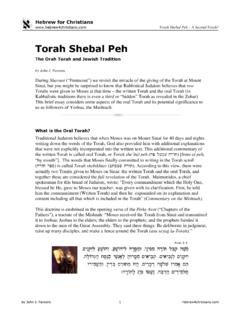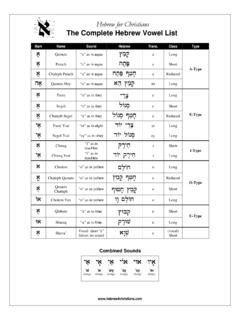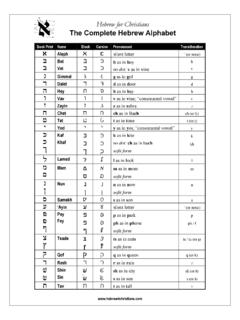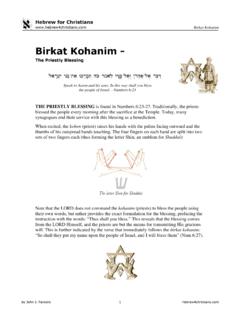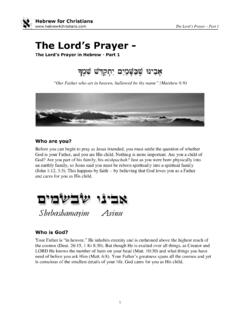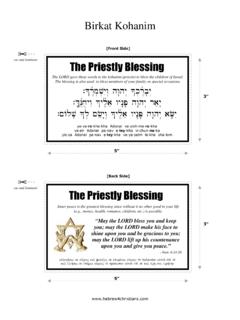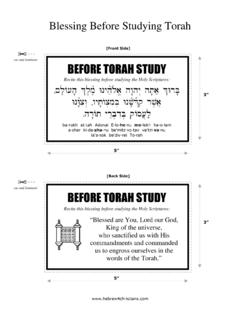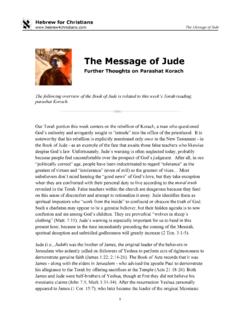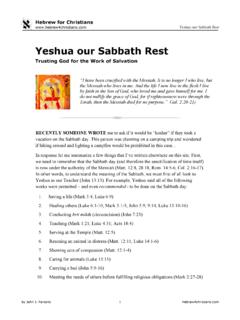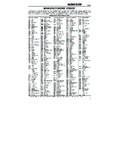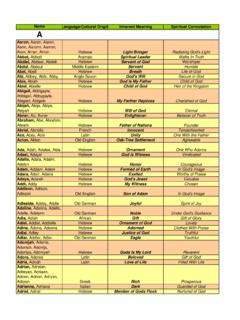Transcription of Chanukah - hebrew4christians.com
1 Hebrew for Christians by John J. Parsons 1 The Festival of Chanukah - Dedicated against assimilation And it was at Jerusalem the feast of Chanukah , and it was winter. - John 10:22 The Hebrew word Chanukah means "dedication" and marks an eight day winter celebration (from Kislev 25 - Tevet 3) that commemorates the rededication of the Second Temple after a small group of Jewish believers defeated the forces of assimilation at work in their world. As such, Chanukah represents the victory of faith over the ways of speculative reason, and demonstrates the power of the miracle in the face of mere humanism. The Story of Chanukah According to mainstream Jewish tradition, the story of Chanukah goes something like this. In 333 BCE, Alexander the Great conquered Syria, Egypt and Babylonia, and promoted a lenient form of Hellenistic culture, encouraging the study of the language, customs and dress of the Greeks.
2 Alexander was not necessarily bad to the Jews, and a legend tells that when he marched through Jerusalem he asked the High Priest to erect a statue to his honor within the Temple. The High Priest told Alexander that such was forbidden, though the Jewish people would construct a living memorial by naming all their firstborn sons after the great king. Alexander agreed to this and things went fairly well for the Jews. Nevertheless, the encounter of the Jewish people and their Torah-based ethics with the worldview of ancient Greece proved to be a traumatic shock which ultimately threatened to undermine the very existence of Judaism. Over a century later, in 167 BCE, the ripened fruit of Hellenization began to appear in the form of one of Alexander's successors, the Syrian king Antiochus IV ("Epiphanes"), who began to openly persecute the Jews.
3 Among other atrocities, Antiochus appointed a Hellenistic High Priest to the Temple, prohibited the study of the Torah, and desecrated the altar by requiring pigs to be sacrificed on it (the Jews referred to Antiochus not as Epiphanes, God ( , Zeus) made manifest, but rather as Epimanes - the madman. ) These outrages finally incited rebellion, and by 165 BCE the Hasmonean family of Mattathias the High Priest and his youngest son, Judah Maccabee (the Hammer ), organized a revolt that eventually succeeded in evicting the Syrian-Greeks from Israel. The Temple in Jerusalem was liberated but needed to be rededicated for Jewish worship. Hebrew for Christians by John J. Parsons 2 The Festival of According to later tradition (as recorded in the Talmud (Shabbat 21b)), at the time of the rededication (on Kislev 25), there was very little oil left that had not been defiled by the Syrian-Greeks.
4 Oil was needed for the menorah to burn continually in the Temple, but there was only enough to last for one day. Miraculously, the sanctified oil burned for eight days -- the time needed to prepare a fresh supply of oil for the menorah. An eight day festival was declared to commemorate this miracle. A Wintertime Sukkot? Interestingly, the story outlined above derives from extra-biblical literature, as well as from the Apocrypha (Books of the Maccabees), except that there is no mention of the oil nor of the miracle of the oil in these sources. Only until we reach the time of the Gemara (the later part of the Talmud that was commentary on the Mishnah, completed around 500 AD) do we hear anything about the miracle of the oil in connection with the rededication of the Temple.
5 This has led some Jewish scholars to suggest that perhaps Chanukah was originally intended to be a later celebration of Sukkot, generally considered to be the most important of all the Jewish holidays, which the Hasmoneans did not have a chance to celebrate during their warfare with the Syrians. Customs of Chanukah Regardless of the relative obscurity of the origins of Chanukah , Rabbinic tradition has instituted various rules (mitzvot) and customs (minhagim) for the observance of this eight-day festival to commemorate the Jews victory over their enemies. Among these are: Celebrating Chanukah for eight days, from Kislev 25 to Tevet 3 on the Jewish calendar (Talmud: Shabbat 21b) Lighting the Chanukiah, a special form of menorah designed to recall the miracle of the eight days in which the sanctified oil burned in the temple.
6 The nightly kindling of the Chanukiah with its increasingly brighter light is a symbol of godly resistance to both tyranny and the forces of assimilation (Talmud: Sukkah 46a). Be joyous on Chanukah and avoid signs of sadness ( , no mourning or fasting, except in the case of shiva [Talmud: Shabbat 21b]). Hebrew for Christians by John J. Parsons 3 The Festival of Chanukah Candle Lighting Blessings The procedures for lighting the chanukiah ( Chanukah menorah) are as follows. On the first night, set the first candle in the rightmost holder (as you face the chanukiah). Next, light the shamash (servant candle), recite the Hebrew blessings, and then light the first candle using the shamash. After kindling the first candle, set the shamash in its holder.
7 Recite the Haneirot Hallalu (see below) and begin to celebrate! On the second night, set the candles from right to left in the chanukiah. That is, beginning at the rightmost holder, put one candle, then put another candle in the holder to its left. Next, light the shamash, recite the Hebrew blessings, and then light the candles from left to right in the chanukiah (in other words, you begin lighting the newest candle first). Recite the Haneirot Hallalu and then celebrate! This procedure continues until the eighth night, when the entire chanukiah is lit up: Note: The last night of Chanukah is called Zot Chanukah , This is Chanukah , and sometimes includes additional meditations. It marks the grand finale of the Chanukah celebration, where the supernatural light burns brightest!
8 Hebrew for Christians by John J. Parsons 4 The Festival of Traditional Chanukah Blessings When lighting the candles for Chanukah , the following blessing is said: Blessed art thou, Lord our G-d, King of the universe, who sanctifies us with Thy commandments and commanded us to kindle the light of Chanukah . Barukh attah Adonai Eloheinu Melekh ha-olam, asher kideshanu bemitzvotav, vetzivanu lehadlik ner shel Chanukah . The second blessing (she'asah nissim the One who works miracles) is then recited (just before or immediately following the candle lighting): Blessed art thou, Lord our God, Master of the universe, who performed miracles for our fathers in those days at this time. Barukh attah Adonai Eloheinu Melekh ha-olam, she asah nissim la avoteinu bayamim hahem, ba-zeman hazzeh.
9 Hebrew for Christians by John J. Parsons 5 The Festival of On the first night of Chanukah (only), we add the following blessing: Blessed art thou, Lord our God, Master of the universe, who has kept us alive and sustained us and has brought us to this special time. Barukh attah Adonai eloheinu melekh ha-olam, she-hecheyanu v ki-yemanu v higianu lazeman hazeh. Hebrew for Christians by John J. Parsons 6 The Festival of Haneirot Hallalu - the closing paragraph After one candle has been kindled, the Haneirot Hallalu may be recited while lighting the other candles: (See next page for transliteration.) Hebrew for Christians by John J. Parsons 7 The Festival of Haneirot Hallalu - transliteration We kindle these lights (to commemorate) the miracles and wonders and the saving acts that You have performed for our forefathers, in those days at this time, by Your holy priests.
10 And all throughout the eight days of Chanukah , these lights are holy, and we are not permitted to make use of them, but only to behold them, in order to offer thanks and praise to Your great Name for Your miracles, for Your wonders and for Your salvation. Haneirot hallalu anachnu madlikin al hanissim ve'al hanifla'ot, ve'al hateshu ot, ve al hamilchamot, she'asita la'avoteinu bayamim hahem, bazeman hazeh al yedei kohanekha hakedoshim. Vekhol sh'monat yemei Chanukah Haneirot hallalu kodesh hem. Ve'ein lanu reshut lihishtamesh bahem ela lir'otam bilvad kedei lehodot ulhallel lishimkha hagadol al nisekha ve'al nifle'otecha ve'al yeshuatekha. Note: On Friday night the Chanukah lights are lit before the Shabbat candles (and on Saturday night they are light during Havdalah).
